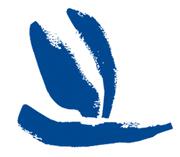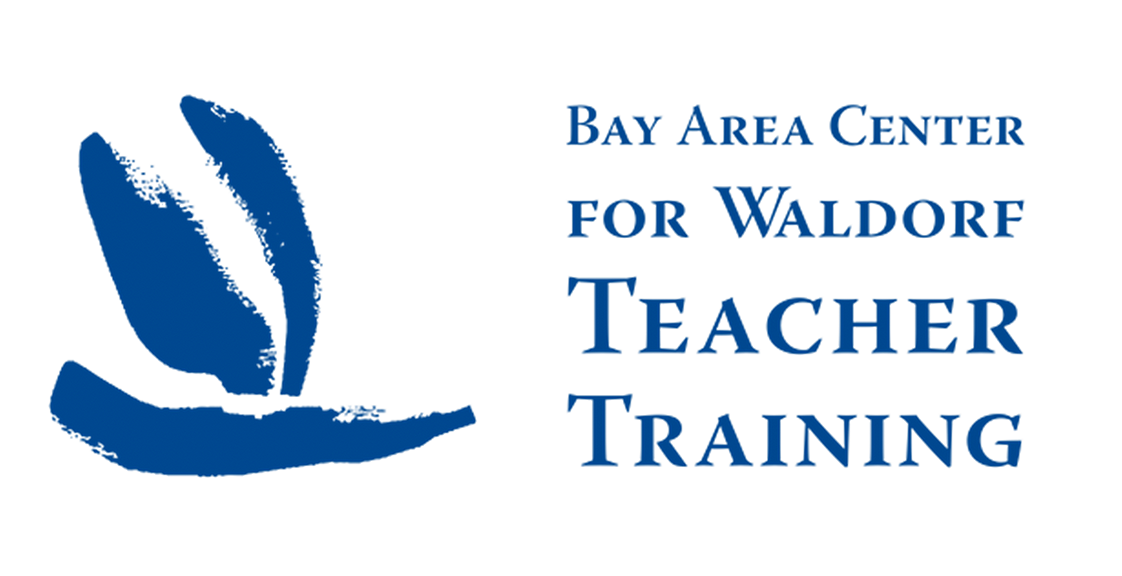Dear BACWTT Students, Alumni, Friends and Colleagues,
Here is the verse from the Calendar of the Soul for this week:
Verse 30
Within my being’s depths there speaks
Mysteriously the Word of Worlds
Urging to be revealed:
‘Imbue you labor’s aims
With spirit light of mine
To offer up yourself through me.’
The verse this week picks up, develops and transforms the verse from the week before.
The possibility to discern something subtle and fine in our inner being is transformed this week into listening to the mysterious Word of Worlds.
The possibility to join modestly to the world processes is transformed into offering up our spirit-filled labors.
Similar to last week, this verse asks us first to deeply listen and then, secondly, to work out of a spiritually imbued will.
There are two phrases that lead us into deep realms: “the Word of Worlds” and to “offer up.”
Last week, we heard of the “self of worlds.” This week, it is the “Word of Worlds.” These are thoughts far beyond the everyday and lead us into deep mysteries. We can sense something of this mystery of the word when we hear the opening line of the Gospel of St. John, “In the beginning was the word.” A strange and remarkable idea compared to modern physics – atoms colliding and the big bang of substances compressed beyond imagining until they explode with enough force to generate the entire present universe of galaxies. To consider instead that, in the beginning, was word is clearly of another order of awareness.
We feel the creative, generative power of the word expressed in the Hebrew creation story in Genesis when God says things and they are created, and when God gives the things their names:
“And God said, Let there be light: and there was light. And God saw the light, that it was good: and God divided the light from the darkness. And God called the light Day, and the darkness he called Night.”
Later in Genesis, we find Adam endowed with this power of speech and of naming:
“And out of the ground the Lord God formed every beast of the field, and every fowl of the air; and brought them unto Adam to see what he would call them: and whatsoever Adam called every living creature, that was the name thereof. And Adam gave names to all cattle, and to the fowl of the air, and to every beast of the field.”
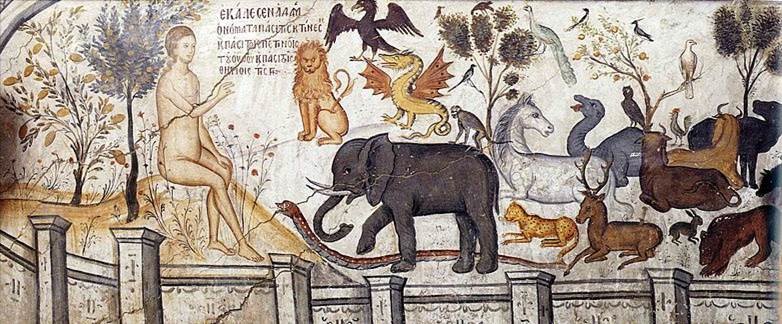
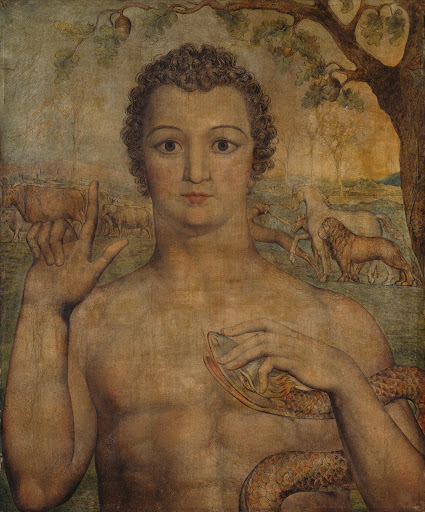
Both of these paintings create an impression – through the expression of Adam – of the importance of thought in this naming process. The thought, connecting to the original idea, finding its way into sound and language. In the best of situations, the name that is given is true to the origins of the thing being named. There is a bonding between the sound, word, and thought. What is expressed in the name helps us to remember and reconnect to the spiritual origin of the thing – the plant, animal, person.
In The Cosmic Word and Individual Man, Rudolf Steiner points to a reawakening to the importance and power of the word:
“In present-day anthroposophical life we must begin to develop an art which was one of the arts of the old Mysteries — those Mysteries which were based on a quite different kind of knowledge from that of to-day, and yet possessed in their customs, and in their whole way of conducting affairs, a great deal that has been lost, and must be renewed. The art I mean can be described, quite in accordance with the intentions of the old Mysteries, thus: from words there must be drawn Spirit. But when, in the old Mysteries, they spoke of Word, or Logos, they meant something very much more significant than is generally meant to-day. We have to learn to find again a deeper and deeper meaning in the objects and processes of the world — and once more: Spirit must be drawn forth from words.”
This is a reversal of the process that we find in Genesis; it is a process of looking at what has been created (objects and processes) and discovering in them their spiritual origins, of working from the created back to the idea and forces. From the “name” back to the “word” that brought them into existence.
The second half of this week’s verse points to a whole field of practice in Waldorf education and Anthroposophy – to imbue our labor with spirit, to do our work in a mood of giving and offering. Of course, this is a challenge and we need to find a balance between this and being in the world and finding ways to meet our needs. Steiner expresses in many places the thought that we should not run away from the world or try to create isolated and beautiful bubbles that protect us from the challenges of modern life, but rather find the right way to bring the inner and spiritual qualities into the world and into our work.
This can be a daily meditation for Waldorf teachers: How can I imbue my work with the quality of “offering up?” By asking this question and thinking this thought, we alter something in us; it changes the focus of our work, how we meet students, how we address parents, how we interact with colleagues.
In Lecture 11 of The Younger Generation (which we have just explored last week in the Foundation Studies), Steiner speaks about what it takes to become a teacher:
“[T]he configuration of the soul in the human being is what is essential in practical pedagogy, in instruction and in education….”
Earlier in this lecture Steiner says something extraordinary:
“We cannot become teachers through study. We cannot drill others into being teachers, because each one of us is already a teacher. All human beings are teachers but the teacher within is slumbering and must be awakened, and art is the awakener.”
He continues:
“When this is developed, it brings the teachers, as human beings, nearer to those whom they would educate. And as human beings the pupils must get something from the educators as human beings.”
I would like to propose that the art of living into verses is one of the arts that Steiner is talking about as an “awakener” for would be teachers – that travelling through the year with the Calendar of the Soul, and with other verses, can alter “the configuration of the soul.”
We should be interested in and looking for opportunities to make adjustments to our configuration of soul. At this time of year, when we hear of the idea and contemplate the words “offer up,” we should allow this thought to live together with other aspects of the Advent season so that we may be able to adjust and attune to the processes around us.
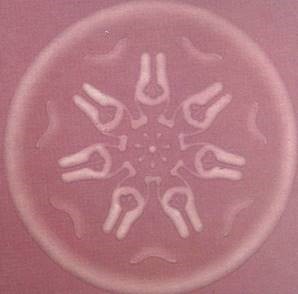

There is a gesture in the verse this week that is expressed in one of the planetary forms – seals and columns that Rudolf Steiner created. We find this beautiful gesture in the Moon seal. In the darker color, you can see a form that reaches up like a chalice and, above it, a form like a plant reaches down. They are surrounded by a form in the lighter color that resembles a tuning fork. We can listen to “the Word of Worlds” that comes from above. We can “offer up our labor” from below. This image calls forth the same mood as the verse – of a gentle give and take, of making a space to receive.
In contrast to this, I was very disturbed by listening to a program on NPR this week, which concerned the teachers unions and returning to school during Covid-19 precautions. A number of people – educationalists, reporters on education and parents phoning in – expressed an idea that is commonplace, but is really being voiced with great conviction during this time.
It is the idea that children who are missing school because of Covid-19 are being developmentally deprived and this will be a setback for life. That missing math in 2nd grade during these restrictions, for example, is a monumental lifetime handicap that can never be recovered. That the aspects of social and emotional development that are being missed will be permanent, unrecoverable. In listening to this program, I sympathize with all of the challenges and upheaval that people are experiencing (and for some people this is much tougher than others), but I am deeply concerned about what this time is really revealing about our understanding and feeling for education, for school, for what children should be doing with their early life.
This idea grows out of a certain picture: that the education system, the curriculum and the teachers are responsible for child development. That human and child development is solely held, guided and regulated by human beings, particularly the professionals trained in this work. Even parents are not qualified to guide the development of their child. That time out of the classroom is lost time.
It has been a long road to get to this point where we have no trust in the wisdom of the body to unfold and support the child’s inner development. That there is no trust in either the organic wisdom of nature in the growing child, or in the influence of the spiritual over the child’s development – the child’s Angel, if you will. That there is no trust in the child themselves – their own will, determination, interest and self-direction. And that here is no trust in the educational value of the world and of life – that a child left to play and create and discover by themselves or with a friend is missing out on a true preparation for life.
Into this condition that modern education has arrived at, Waldorf education offers a very different avenue. And while we are going about now trying to figure out how to push the reset button, it will be good to allow this difference that is at the heart of Waldorf to become better known.
Ken
Kenneth Smith
Director
BACWTT

